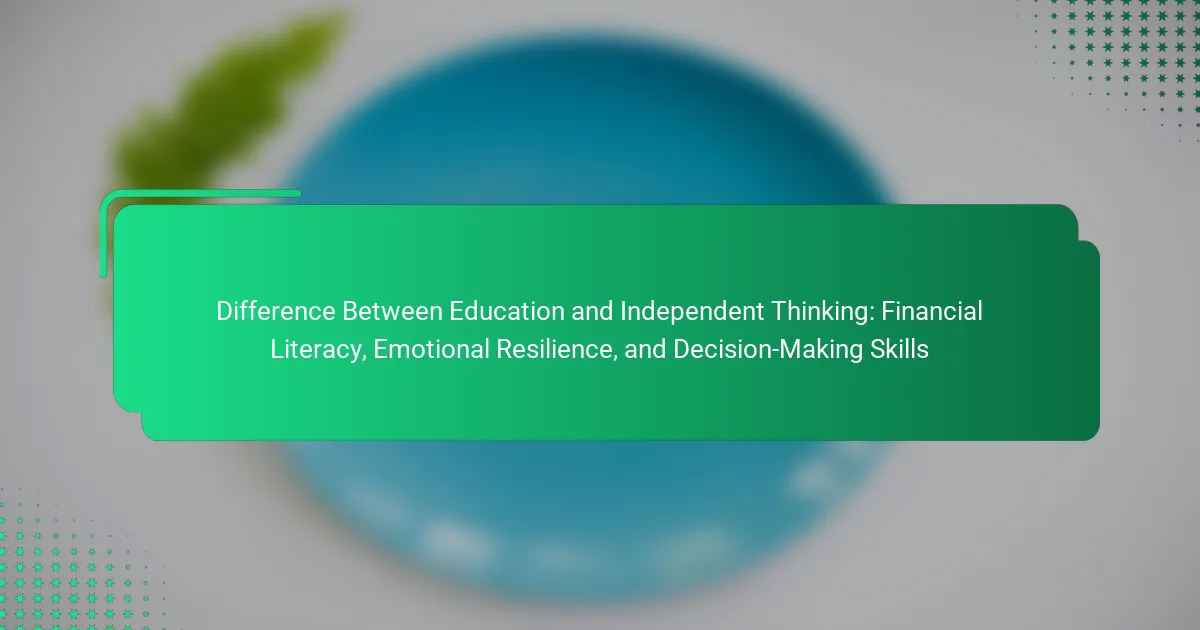Understanding the difference between education and independent thinking is crucial for enhancing financial literacy, emotional resilience, and decision-making skills. Education provides foundational knowledge, while independent thinking fosters critical analysis and personal choice. Financial literacy promotes informed financial decisions, emotional resilience helps manage stress, and effective decision-making skills lead to better financial outcomes. Together, these elements create a comprehensive approach to navigating financial challenges successfully.
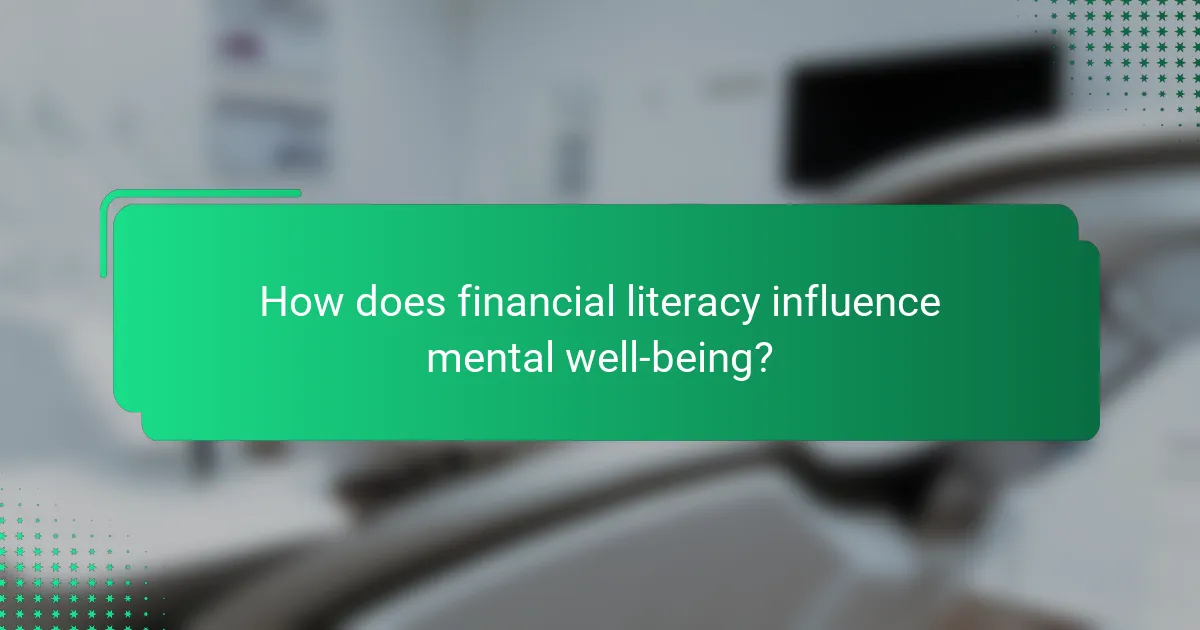
How does financial literacy influence mental well-being?
Financial literacy significantly enhances mental well-being by fostering confidence and reducing anxiety about financial decisions. Individuals with strong financial literacy skills can make informed choices, leading to better financial stability and emotional resilience. This stability decreases stress and promotes a healthier mindset. Furthermore, financial literacy encourages proactive decision-making, empowering individuals to navigate challenges effectively, which contributes to overall mental health.
What are the key components of financial literacy?
Key components of financial literacy include understanding financial concepts, managing personal finances, and making informed decisions. These elements empower individuals to navigate financial challenges effectively. Financial literacy enhances emotional resilience by promoting confidence in decision-making. It also fosters independent thinking, enabling individuals to evaluate options critically.
How does financial literacy impact decision-making skills?
Financial literacy significantly enhances decision-making skills by equipping individuals with the knowledge to analyze financial information effectively. This understanding fosters emotional resilience, enabling better responses to financial stress. Individuals with strong financial literacy can evaluate risks and benefits, leading to informed choices. Studies show that financially literate individuals are more likely to save and invest wisely, demonstrating a clear link between financial knowledge and improved decision-making outcomes.
What role does budgeting play in financial literacy?
Budgeting is essential for financial literacy as it empowers individuals to manage their resources effectively. It enhances decision-making skills by providing a clear overview of income and expenses. A well-structured budget fosters emotional resilience by reducing financial stress and uncertainty. Furthermore, it promotes independent thinking through the evaluation of spending priorities and financial goals. By mastering budgeting, individuals cultivate a proactive approach to their financial well-being, ultimately leading to improved financial outcomes.
How does understanding credit affect financial decisions?
Understanding credit significantly influences financial decisions by shaping how individuals assess risks and opportunities. A solid grasp of credit can lead to better borrowing choices, improved budgeting, and enhanced savings strategies. Individuals with strong credit knowledge tend to exhibit greater emotional resilience when facing financial challenges, as they can make informed decisions rather than impulsive ones. This understanding fosters independent thinking, enabling people to navigate complex financial landscapes effectively. As a result, they are more likely to achieve long-term financial stability and success.
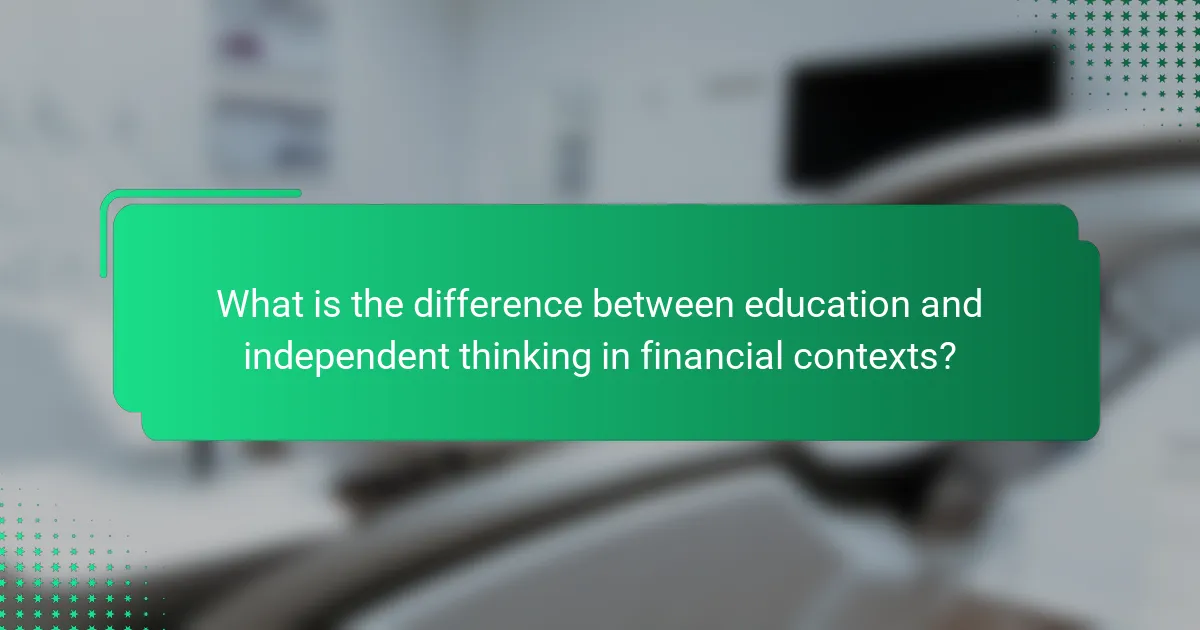
What is the difference between education and independent thinking in financial contexts?
Education provides foundational knowledge in financial concepts, while independent thinking fosters critical analysis and personal decision-making. Financial literacy, a key attribute of education, equips individuals with essential skills for managing money. In contrast, emotional resilience, a unique attribute of independent thinking, enables individuals to navigate financial challenges effectively. Decision-making skills benefit from both education and independent thinking, as informed choices often lead to better financial outcomes. Ultimately, the synergy between education and independent thinking enhances overall financial competence.
How does traditional education shape financial perceptions?
Traditional education often instills rigid financial perceptions, limiting independent thinking. It emphasizes standardized knowledge and compliance, which can hinder emotional resilience and adaptive decision-making skills. Research indicates that individuals educated in traditional systems may struggle with innovative financial solutions due to a lack of critical thinking training. This can perpetuate a cycle of financial dependency on established norms rather than fostering personal financial literacy. Ultimately, the gap between education and independent thinking can significantly affect one’s approach to financial challenges.
What are the limitations of formal financial education?
Formal financial education has limitations that can hinder true financial literacy. It often focuses on theoretical concepts without addressing practical applications. This disconnect can lead to a lack of emotional resilience in decision-making. Furthermore, formal education may not encourage independent thinking, which is crucial for navigating real-world financial challenges. Consequently, individuals may struggle to apply learned principles effectively in their personal finance situations.
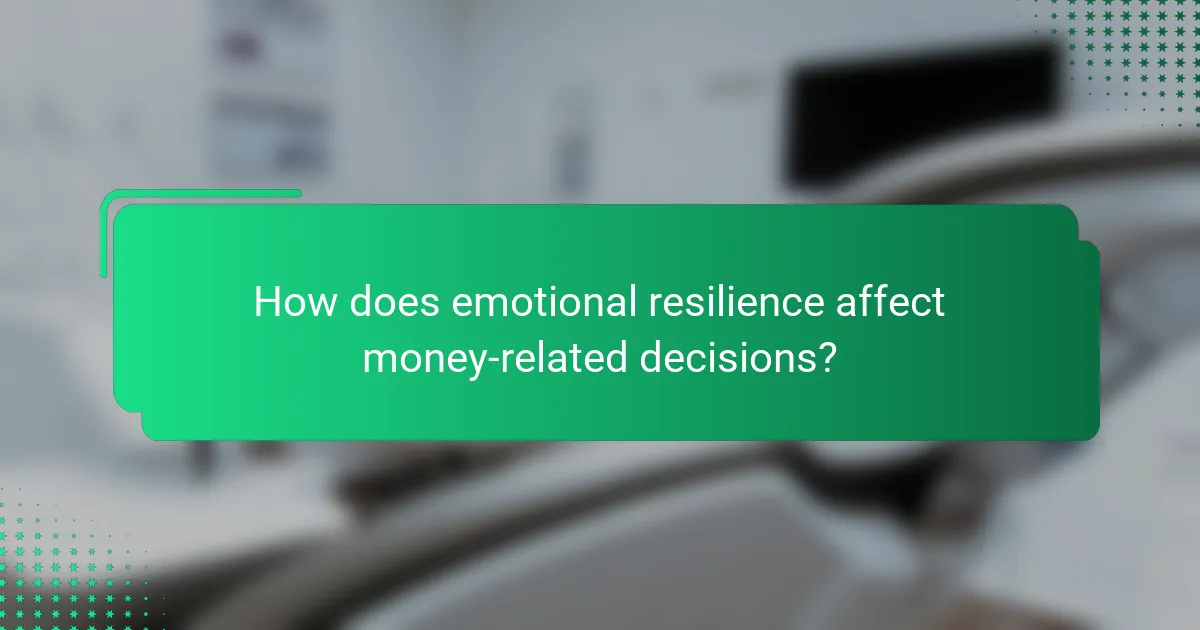
How does emotional resilience affect money-related decisions?
Emotional resilience significantly influences money-related decisions by enabling individuals to manage stress and uncertainty. Resilient people are better equipped to make informed financial choices, avoiding impulsive reactions to market fluctuations. They can evaluate risks and rewards more effectively, leading to improved budgeting and investment strategies. Emotional resilience fosters a long-term perspective, allowing individuals to prioritize financial goals over immediate gratification. This attribute enhances decision-making skills, ultimately contributing to greater financial stability and success.
What are the psychological effects of financial stress?
Financial stress can lead to anxiety, depression, and impaired decision-making. It negatively impacts emotional resilience and reduces financial literacy. Stress triggers cognitive overload, hindering independent thinking. Individuals may resort to avoidance behaviors, worsening their financial situation. Addressing these psychological effects is crucial for improving overall well-being.
How can emotional resilience be developed for better financial choices?
Emotional resilience can be developed through self-awareness, coping strategies, and supportive environments. Building emotional resilience enhances financial decision-making by reducing impulsive choices driven by stress or anxiety. Practicing mindfulness techniques can improve emotional regulation. Seeking financial education also fosters confidence, enabling better choices. Engaging in reflective practices helps individuals learn from past financial experiences, reinforcing resilience.
What strategies enhance emotional resilience in financial decision-making?
Building emotional resilience in financial decision-making involves developing self-awareness, managing stress, and practicing mindfulness. These strategies enhance one’s ability to navigate financial challenges effectively.
Self-awareness allows individuals to recognize their emotional triggers related to money. Managing stress through techniques like deep breathing or exercise can prevent impulsive decisions. Mindfulness practices, such as meditation, help maintain focus and clarity during financial evaluations.
Additionally, seeking support from financial advisors or peer groups fosters a collaborative learning environment, enhancing emotional resilience. Engaging in continuous education about financial literacy further strengthens decision-making skills.
In summary, combining self-awareness, stress management, and mindfulness practices creates a robust framework for emotional resilience in financial decision-making.
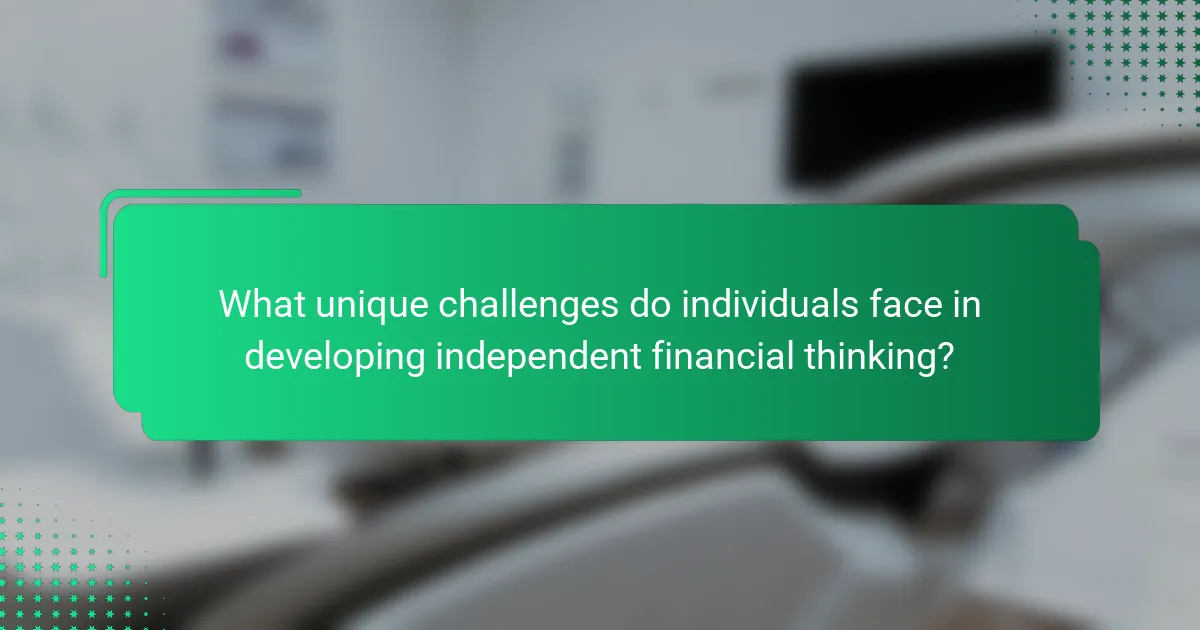
What unique challenges do individuals face in developing independent financial thinking?
Individuals face unique challenges in developing independent financial thinking due to a lack of financial literacy, emotional resilience, and decision-making skills. Many receive formal education focused on theoretical knowledge but lack practical application. This gap leads to difficulties in managing personal finances effectively. Emotional factors, such as fear of loss or overconfidence, can hinder sound financial decisions. Additionally, the absence of real-world experience can result in poor judgment, making it hard to navigate complex financial landscapes. Building these skills requires intentional practice and exposure to real-life financial scenarios.
How do societal norms influence independent financial decisions?
Societal norms significantly shape independent financial decisions by influencing perceptions of success, risk, and spending. These norms dictate acceptable behaviors and expectations regarding money management. Individuals often conform to societal pressures, leading to decisions that align with group values rather than personal financial goals. For instance, cultural expectations around homeownership can compel individuals to prioritize buying a home over other investments, despite personal financial situations. This impact underscores the need for financial literacy, as understanding personal values can enhance emotional resilience and improve decision-making skills.
What role do personal values play in financial independence?
Personal values significantly influence financial independence by shaping decision-making and prioritizing long-term goals. Individuals with strong values often demonstrate emotional resilience, allowing them to navigate financial challenges effectively. This alignment between values and financial choices fosters better financial literacy, enhancing the ability to manage resources wisely. Ultimately, personal values serve as a guiding framework, impacting spending habits and investment strategies, which are crucial for achieving financial independence.

What rare attributes contribute to effective money decision-making?
Effective money decision-making relies on rare attributes such as adaptability, foresight, and critical thinking. Adaptability allows individuals to adjust strategies based on changing financial landscapes. Foresight enables anticipation of future financial trends, while critical thinking aids in evaluating complex situations. These attributes enhance financial literacy and emotional resilience, ultimately leading to better decision-making outcomes.
How does creativity enhance financial problem-solving?
Creativity enhances financial problem-solving by fostering innovative solutions and adaptive thinking. It allows individuals to approach financial challenges from diverse perspectives, leading to unique strategies. This independent thinking complements financial literacy and emotional resilience, creating a holistic decision-making framework. Studies indicate that creative problem-solving can significantly improve financial outcomes, enabling better risk assessment and resource allocation.
What is the impact of risk tolerance on financial decisions?
Risk tolerance significantly influences financial decisions by shaping investment strategies and choices. Individuals with high risk tolerance often pursue aggressive investments, seeking higher returns despite potential losses. Conversely, those with low risk tolerance tend to favor conservative options, prioritizing capital preservation. This divergence affects portfolio diversification, asset allocation, and overall financial planning. Understanding one’s risk tolerance is crucial for achieving long-term financial goals and maintaining emotional resilience during market fluctuations.

What best practices can enhance financial decision-making skills?
Improving financial decision-making skills involves cultivating financial literacy, emotional resilience, and independent thinking. Focus on continuous education through courses and literature. Practice emotional regulation to manage stress during decisions. Engage in reflective thinking to evaluate past choices and learn from them.
How can individuals cultivate a mindset for financial success?
To cultivate a mindset for financial success, individuals must prioritize independent thinking alongside education. Financial literacy equips individuals with essential knowledge, while emotional resilience enables them to navigate setbacks. Decision-making skills empower individuals to make informed choices, ultimately leading to sustainable financial growth. Developing these attributes fosters a proactive approach to financial challenges, enhancing overall success.
What common mistakes should be avoided in financial decision-making?
Common mistakes in financial decision-making include relying solely on education without independent thinking, neglecting emotional resilience, and failing to develop decision-making skills. These errors can lead to poor financial outcomes. Overconfidence in knowledge can result in uncalculated risks. Emotional responses can cloud judgment, causing hasty choices. Additionally, lack of critical thinking may prevent effective analysis of financial situations. Avoiding these pitfalls requires a balance of knowledge, emotional control, and analytical skills.
What expert insights can guide better financial choices?
Expert insights emphasize the importance of combining financial literacy with emotional resilience and independent thinking. This integration enables individuals to make informed decisions and adapt to changing financial landscapes.
Financial literacy provides knowledge of budgeting, investing, and saving, while emotional resilience helps manage stress during financial setbacks. Independent thinking fosters unique approaches to financial challenges, leading to innovative solutions.
Research shows that individuals with strong financial literacy are more likely to achieve their financial goals. Additionally, cultivating emotional resilience can enhance decision-making skills, allowing for better responses to market fluctuations.
Incorporating these elements into financial education can lead to more sustainable financial practices and improved overall well-being.
